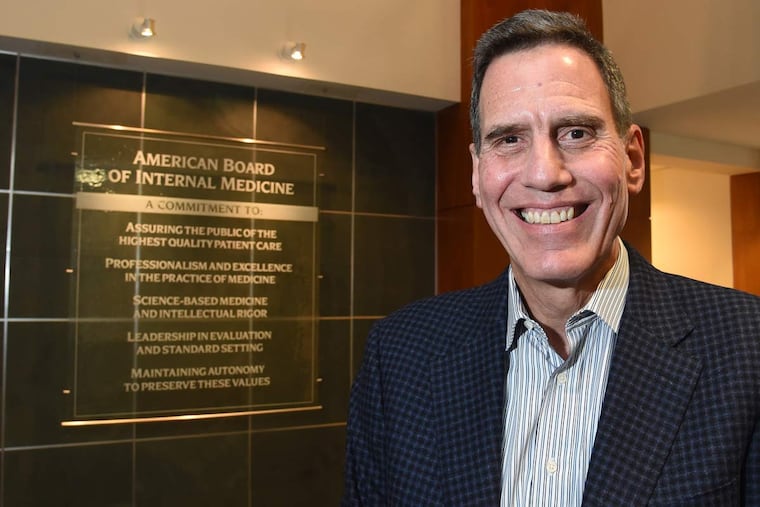The American Board of Internal Medicine is under fire for a ‘maintenance of certification’ requirement. Their own tweet didn’t help.
More than 12,000 people signed an online petition asking ABIM to pause their re-certification program.

Thousands of physicians are petitioning the Philadelphia-based American Board of Internal Medicine to loosen ongoing certification requirements they say are excessive.
The nonprofit ABIM sets training and assessment requirements — and fees — that doctors in a range of internal medicine fields, including subspecialties such as cardiology and oncology, must meet to be considered board-certified. About a quarter of doctors in the United States are certified by ABIM, a requirement for employment at many hospitals.
In 1990, ABIM began requiring doctors to renew their certification every 10 years — previously they were certified once, for life. Since then, the organization has continued to add requirements in between their 10-year recertification. The most recent addition in 2022, the Longitudinal Knowledge Assessment, allows doctors to take 30-question quizzes every quarter instead of a much longer once-a-decade test.
This program costs physicians $220 a year.
Frustration among physicians who feel they are being asked to do increasingly more to prove their competency has been building for years and in recent weeks, boiled over for many. At least 12,000 people have signed a Change.org petition, which is open to anyone. Many added their name after the petition’s organizer resurfaced a July tweet in which ABIM suggested their ongoing certification was so easy, doctors could do it while on vacation.
“It’s just one more piece of control that we have lost,” said Aaron Goodman, a hematologic oncologist at the University of California-San Diego who started the petition. “It’s just one more added stress.”
Faced with unprecedented rates of burnout and health-care workforce shortages (not to mention huge school loans), Goodman and other doctors say ABIM’s process does little to improve safety or care for patients, while adding to their stress and workload.
When asked about the petition, ABIM defended its maintenance of the certification program as an essential way to ensure doctors’ skills remain up-to-date.
“It’s important for doctors to maintain standards that protect patients, and to use the institutions we created for this very reason,” said Richard Baron, ABIM president and CEO.
» READ MORE: An uproar over how to certify doctors (Published in 2015)
ABIM tweet fuels the fire
Goodman thinks ABIM certification is redundant because he is already required to meet continuing medical education requirements by both his state board of medicine for his license and by his hospital for his credentials to practice.
Yet hospitals require ABIM certification, he said. Losing it could mean he’s out of a job.
“Doing any of it is not making me a better doctor,” Goodman said. “We do it because we don’t want to lose our livelihoods.”
Frustrated, he took to X, formerly known on Twitter, on July 21 and shared an online petition that called on ABIM to suspend their maintenance of certification program. The response was overwhelming, as thousands signed on and many tweeted in support of his effort.
ABIM fueled the fire when it tweeted a photo of a physician answering her required quarterly questions at a folding table outside the RV she’s driving through the 48 lower states on an “adventure of a lifetime.” The tweet initially got little attention, but it struck a chord with doctors when Goodman resurfaced it as part of his campaign. Doctors responded with sarcastic rebuttals of where else they could complete their quarterly questionnaire, such as during childbirth or a wedding.
On Aug. 2, ABIM deleted the tweet and apologized for sending an “unintended message regarding work life balance.”
Debate over usefulness of certification
Despite mounting criticism from doctors, ABIM stands behind its maintenance of certification program.
On a recent episode of the popular medical podcast Healthcare Unfiltered, Baron, ABIM’s CEO, joined Goodman to debate the program’s benefit. He said it’s important for doctors to routinely refresh their training because research suggests people are bad at self-assessing their skills.
In an interview with The Inquirer, Baron pointed to ABIM studies that suggest that physicians who do well in maintenance of certification are more likely to be familiar with most recent guidelines, such as prescribing fewer opioids for back pain as the overdose crisis escalated.
But doctors are skeptical about the quality of the evidence.
“What’s being said here is mostly people’s opinions,” said Jay Giri, an interventional cardiologist at the Hospital of the University of Pennsylvania.
To make that point, Giri researched the link between ABIM’s maintenance of certification and mortality after heart catheterization. Using similar methods to the studies that ABIM conducted, he found that outcomes weren’t better when comparing providers with similar caseloads who did and did not participate in maintenance of certification.
The study isn’t proof that ABIM’s program doesn’t work, he said, but it raises questions about its benefits.
Jennifer Johnson, a hematological oncologist at Thomas Jefferson University Hospital, is also frustrated with the lack of evidence to support all that ABIM is asking her to do. She continues to learn medicine and stay up to date because she wants to give the best care possible for her patients. But the ABIM quizzes and requirements feel redundant to other mandatory continuing medical education.
But she, like many other physicians, feels stuck. She assumes most patients would prefer a board-certified physician over one who is not. But she wonders if people actually know what goes into obtaining that distinction and whether it should carry so much significance.
“I think all of us are starting to question what it means, too,” she said.